
Looking for a more flexible and scalable alternative to Coda? Whether you’re managing a small team or a large enterprise, finding the right platform for collaboration and document management is crucial. In this article, we’ll break down the best Coda alternatives to help you make an informed choice.
While Coda offers a mix of docs and databases, other tools like, FuseBase, SharePoint, Notion, and Quip provide unique advantages that may better suit your workflow.
What is Coda?
Coda is a next-generation workspace tool that blends the capabilities of documents, spreadsheets, and databases into a single, interactive platform. Unlike standard word processors, Coda allows users to build complex workflows, automate processes, and integrate with external tools, making it an all-in-one solution for team collaboration and information management.
Key Features of Coda
- Actionable Docs – Create dynamic documents with embedded tables, buttons, and scripts.
- Data Structuring – Organize and analyze information using relational databases.
- Process Automation – Set up workflows that trigger specific actions automatically.
- Collaborative Editing – Work with teammates in real time and track changes seamlessly.
- Pre-Built Extensions – Use Coda Packs to integrate with external platforms.
Who Uses Coda?
Coda is ideal for remote teams, product managers, and digital agencies that need a flexible alternative to traditional documentation and spreadsheet tools. It is widely used for task automation, project planning, and knowledge base management.
Limitations of Coda
Although Coda offers powerful customization options, it has some drawbacks. It lacks enterprise-level controls, making it less appealing for larger organizations. Additionally, its free plan is limited, and there is no offline access, which can be a major downside for users needing mobile or remote work functionality.
Pros & Cons of Coda
Pros
- All-in-One Collaboration Tool – Combines text, tables, and automation in one workspace.
- Advanced Workflow Features – Automates processes and connects with various third-party apps.
- Interactive Document Experience – Users can build customizable and data-driven reports.
- Integration-Friendly – Works with platforms like Google Calendar, Slack, and Jira.
Cons
- Difficult for New Users – Requires training to fully utilize advanced features.
- Limited Free Plan – Free users face restrictions on rows, integrations, and document size.
- Higher Cost Compared to Some Competitors – Paid plans may not be cost-effective for smaller teams.
- No Offline Mode – Always requires an internet connection.
- Not Fully Optimized for Enterprises – Platforms like FiseBase, SharePoint and Confluence provide more advanced security and control options.
5 Coda Alternatives: Competitor Comparison
1. FuseBase
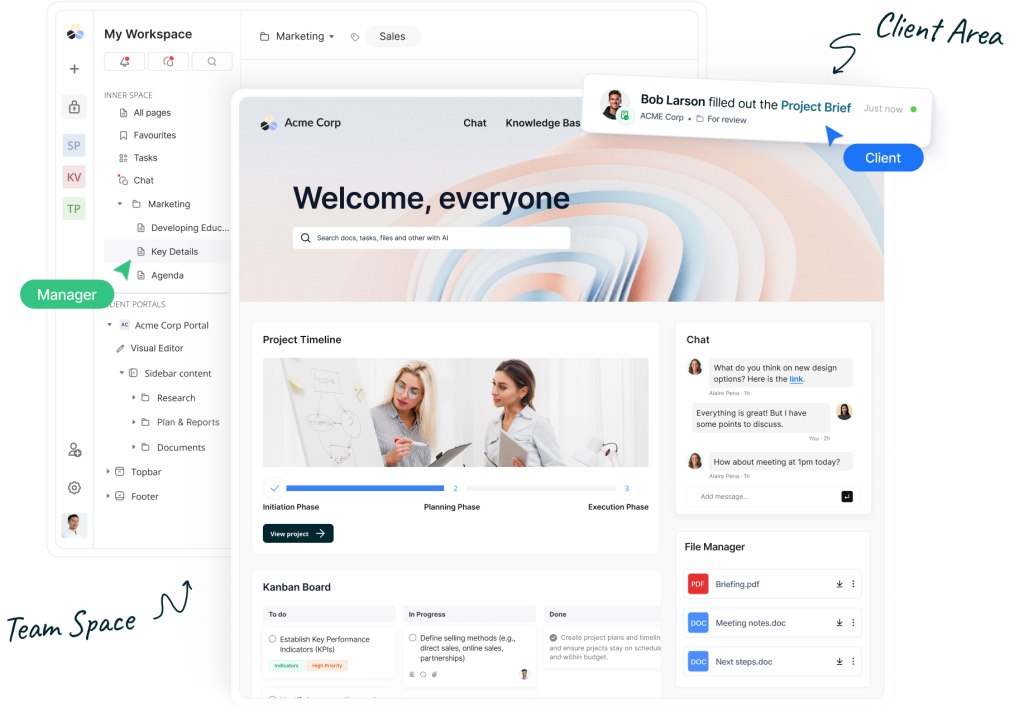
FuseBase is a comprehensive client portal and team collaboration platform designed for businesses that need structured document management, task coordination, and workflow automation. Unlike traditional document editors, FuseBase allows teams to create customizable portals that integrate documents, tasks, files, and automation into a single, interactive workspace. With built-in AI-powered search, e-signature capabilities, and granular permission controls, FuseBase is an excellent choice for companies that need a scalable and flexible workspace for both internal collaboration and client interactions.
Pros:
- Fully customizable client and team portals
- AI-powered search and automation capabilities
- E-signature support for secure document approvals
- Granular permission settings for better data security
- Supports workflow automation and structured processes
Cons:
- Requires time to configure advanced workflows
- Fewer third-party integrations compared to Notion and Airtable
- No free plan, only a trial period available
Pricing:
- Starter: $9 per user per month
- Business: $19 per user per month
- Enterprise: Custom pricing based on company needs
2. Notion
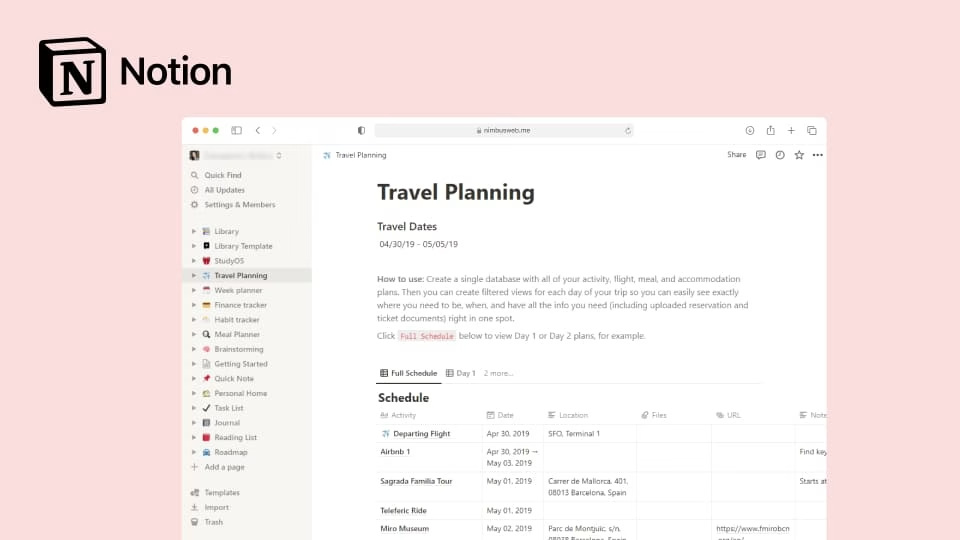
Notion is an all-in-one workspace that combines note-taking, project management, and database functionality in a highly customizable interface. It allows teams to build structured knowledge bases, manage projects, and track workflows with drag-and-drop simplicity. Compared to Coda, Notion is more visually intuitive but lacks advanced automation features and integration capabilities.
Pros:
- Simple and intuitive interface with drag-and-drop functionality
- Customizable pages with embedded databases, tables, and media
- Free plan available with robust core features
- Supports collaboration through real-time editing and comments
Cons:
- Limited automation and integration options compared to Coda
- No offline access for team collaboration
- Can feel overwhelming due to flexibility and customization options
Pricing:
- Free: Basic features for personal use
- Plus: $8 per user per month
- Business: $15 per user per month
- Enterprise: Custom pricing for larger teams
3. Quip
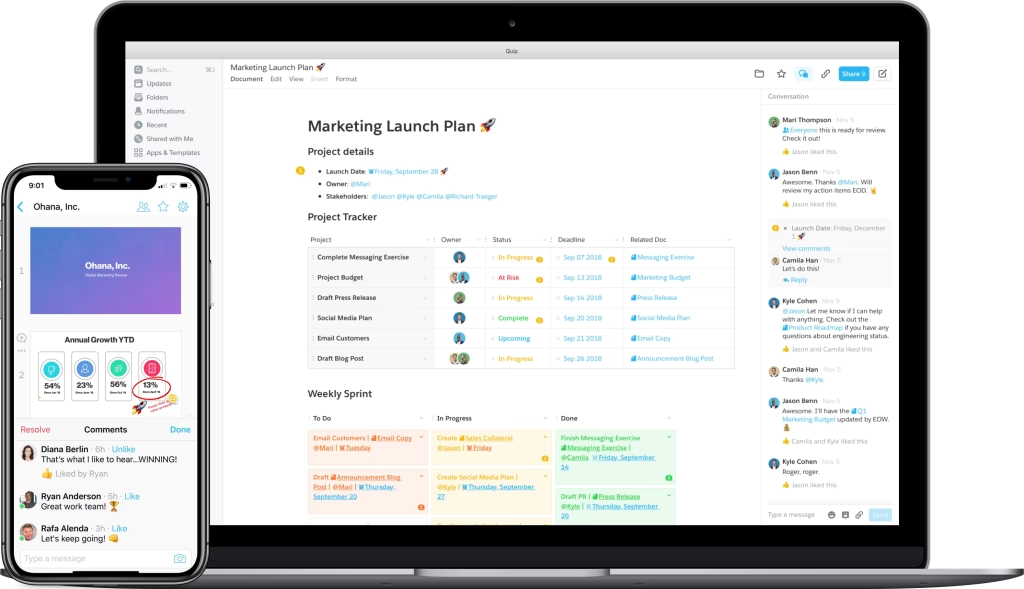
Quip is a document collaboration and team communication tool owned by Salesforce. It combines documents, spreadsheets, and chat functionality in a single workspace, making it ideal for teams that need a real-time collaborative editing environment. Unlike Coda, which focuses on interactive documents with automation, Quip is more communication-driven and is a great fit for Salesforce users.
Pros:
- Seamless integration with Salesforce
- Built-in chat and document collaboration in one interface
- Works well for teams needing live document editing
- Supports team checklists and lightweight project management
Cons:
- Limited database and workflow automation features
- Best suited for teams already using Salesforce
- Lacks the flexibility of Notion or Airtable for structured data organization
Pricing:
- Quip Starter: $10 per user per month
- Quip Plus: $25 per user per month
- Quip Advanced: Custom pricing for enterprise teams
4. Jira
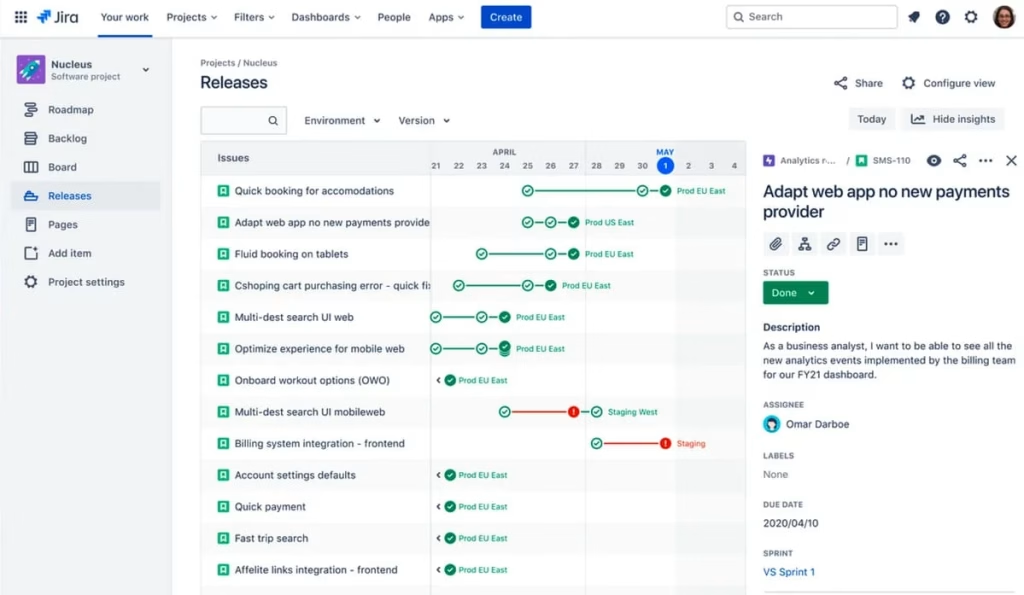
Jira, developed by Atlassian, is a project management and issue-tracking platform widely used in software development teams. It excels in agile project management, offering tools for sprint planning, task prioritization, and real-time reporting. Compared to Coda, Jira is more structured for task and issue tracking, making it a strong choice for engineering and IT teams managing complex projects.
Pros:
- Best-in-class issue tracking and sprint planning tools
- Highly customizable workflows for agile teams
- Integration with Confluence, Bitbucket, and other Atlassian tools
- Supports automation for repetitive project management tasks
Cons:
- Steep learning curve for non-technical users
- Can be complex for small teams or non-development teams
- Higher pricing for premium features
Pricing:
- Free: Up to 10 users with limited features
- Standard: $7.75 per user per month
- Premium: $15.25 per user per month
- Enterprise: Custom pricing for large organizations
5. Airtable
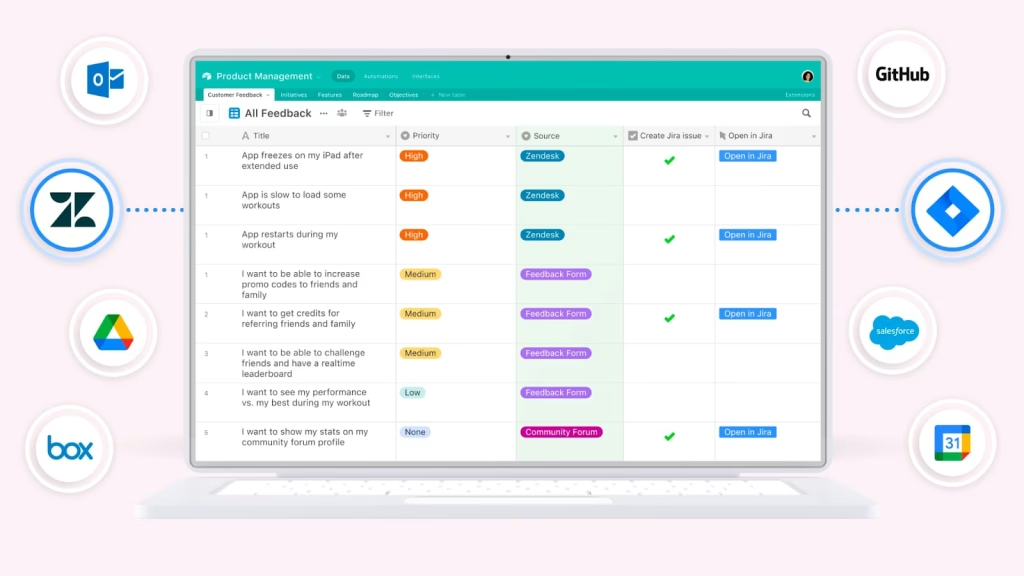
Airtable is a hybrid spreadsheet-database platform that provides teams with a flexible and visual way to organize data. It combines the familiarity of spreadsheets with relational database functionality, allowing users to create highly customizable project tracking, inventory management, and CRM solutions. Compared to Coda, Airtable is more structured for database use but lacks deep automation and document editing features.
Pros:
- Powerful database functionality with an intuitive spreadsheet interface
- Multiple view options (grid, kanban, calendar, gallery)
- Supports automation and integrations with Slack, Zapier, and other apps
- Free plan available with essential features
Cons:
- More suited for structured data management than free-form documents
- Limited reporting and visualization tools compared to Jira
- Advanced collaboration features require higher-tier plans
Pricing:
- Free: Basic features with limited records
- Plus: $12 per user per month
- Pro: $24 per user per month
- Enterprise: Custom pricing for large-scale deployments.
Finding the Right Alternative to Coda
Coda is a powerful tool for collaborative document creation, but it may not be the best fit for every team. Whether you need a more structured database system, advanced project management features, or better integration with existing tools, exploring alternatives can help you find a solution that better aligns with your workflow.
- FuseBase offers a customizable client portal, AI-powered document automation, and structured collaboration for businesses managing complex workflows.
- Notion provides a flexible and visually intuitive workspace, combining document creation, task management, and lightweight databases.
- Quip is a strong choice for teams using Salesforce, integrating collaborative documents with real-time chat and team communication.
- Jira is ideal for agile development teams, offering powerful sprint planning, issue tracking, and workflow automation.
- Airtable is the best option for teams working with relational data, providing a spreadsheet-database hybrid with customizable views and automation.
As each tool serves a different purpose, evaluating their strengths, limitations, and pricing plans can help you make an informed decision. Whether you’re looking for a structured client portal, advanced task tracking, or a more intuitive document workspace, choosing the right alternative can improve collaboration, streamline processes, and enhance overall productivity.

